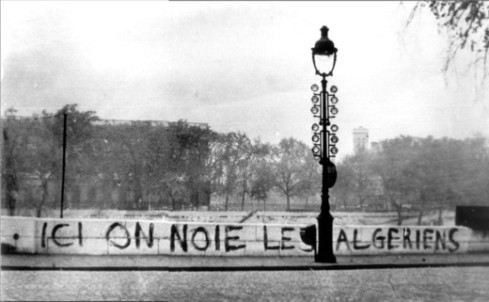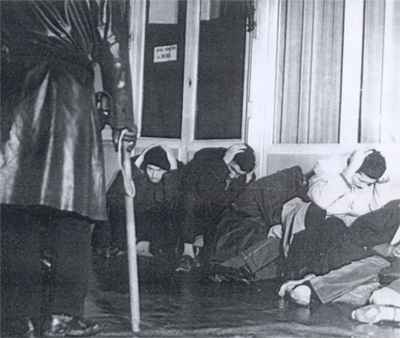The article below was posted on the Socialist Resistance website on December 4 2015, nearly 6 years ago. I was reminded of it by an item on Channel 4 news on September 13 this year at the start of the trial of Salah Abdeslam and others in relation to the murderous attacks in Paris on the night of November 13, 2015. Abdeslam is the sole survivor of the ISIS cell that killed 130 people in cafes and at the Bataclan concert hall. What Abdeslam and his colleagues did was monstrous. but what struck me was that the reporter referred to the killings of November 13, 2015 as the worst massacre to take place on French soil since the Second World War.
This was not an isolated case. A quick glance at google reveals that ITV, BBC news and many other media organisations made exactly the same claim. One or two wrote that it was the worst terrorist atrocity since 1945, which of course leaves open the question of what is a terrorist atrocity.
As I wrote nearly six years ago it was not the worst massacre in Paris (never mind France). At that time I was willing to give the journalists the benefit of the doubt, accepting they probably genuinely believed their claims. But to continue to repeat this false claim six years later smacks at best of very sloppy journalism. If any journalist showed the slightest interest in unearthing the truth they would know that the worst atrocity, the worst massacre in Paris (or France) happened on the night of October 17, 1961.

That massacre was carried out by the Paris police force: the victims were largely Algerian men, women and children taking part in a peaceful demonstration in support of independence for Algeria. Successive French governments tried to suppress all knowledge of this event. As late as 1998 the Algerian newspaper, Liberté, had its entire October 17 edition seized by French officials at Lyon airport. No explanation was given though it was almost certainly connected with an article in that edition by Hakim Sadek entitled 35 Years ago the “Battle of Paris”: When the Seine was full of bodies.

The role of the head of the Paris police, Maurice Papon, both in the massacres of October 1961 and the internment of French Jews in the camp at Drancy velodrome during the Second World War has been known about for many years. He was eventually sentenced to 10 years in prison in 1998 for ordering the arrest and deportation of 1,690 Jews, including 23 children, from the Bordeaux region to Nazi death camps in Germany. He served less than 4 years before being released on health grounds.
He was never tried for his leading role in the October 17 massacres. Indeed 20 years after the brutal murders of at least 200 people when questions were finally being asked about Papon’s collaboration with the Nazis he was minister for the budget in the administration of French Prime Minister Raymond Barre. It took a further 15 years before he was put on trial, not least because of the unwillingness of some French politicians, both Gaullist and Socialist Party, along with senior civil servants, to risk exposing their own involvement in collaboration.

All of this information has been available for many years. I am far from the only person to write about the massacres of October 17, 1961 or of the role of Maurice Papon in the events of that night and of his collaboration with the Nazis. For example the Guardian carried 2 articles on this on the 50th anniversary of the massacres. The Sunday Times carried an article by Charles Masters in its October 12 1997 edition entitled Papon “ordered secret Paris massacre of 1961”. Numerous other articles can be found in other English language publications.
With Google and the internet there is no excuse for journalists failing to make themselves aware of facts. They may wish to interpret those facts in a certain way (for example they may claim that the events of October 17, 1961 cannot be classed as a terrorist attack since they were carried out by the French state and therefore the murders of 13 November 2015 are the worst terrorist atrocity in France since the Second World War). I reject this argument that states cannot be terrorists (in my view many western states are guilty of terrorist attacks and I would include 17 October 1961 among them) but at least those making the argument show an awareness of the events of October 17.
On the 60th anniversary of the police massacre of at least 200 people it is unforgiveable that so many journalists are either ignorant of those events or do not give them any importance. Yes, we owe it to the 130 people who died at the hands of ISIS to remember their brutal murder, to ensure those responsible are punished. But we also owe it to the far greater number of unknown, faceless men, women and children of Algerian or other Arab backgrounds who died 60 years ago at the hands of a brutal, racist police force led by a Nazi collaborator and whose crimes were covered up for so long by successive French governments.
A TALE OF TWO MASSACRES
130 largely young people were brutally murdered in Paris by ISIL: this massacre saw unprecedented expressions of solidarity throughout much of the world. Photos of many of those murdered were printed in western newspapers. The memorial ceremony in Paris was televised in Britain. English football fans sang the Marseillaise – a welcome change from the usual racist and xenophobic chanting frequently directed at Irish people, Turks and anyone else who isn’t English. A welcome change also from the racist abuse and violence directed at a black Frenchman by Chelsea supporters on the Paris Metro. But how much of this expression of support and solidarity is because those murdered were mainly white Europeans.
Some reporters and correspondents have referred to the killings as the worst massacre in France since the Second World War. No doubt they are sincere in this belief but they are wrong. The worst massacre in France since the Second World War took place in Paris on the evening of 17 October 1961.
The reason why so little is known about the 1961 massacre, which probably resulted in about 200 deaths, is that the victims were all Algerians and their killers were the French police. The government had banned demonstrations (how little changes!) but perhaps 30,000 Algerians and their supporters took to the streets in a peaceful demonstration.
Police raids were carried out all over the city, with not only Algerians but Tunisians, Moroccans, even Spanish, Portuguese or Italians (i.e. people who supposedly looked Arabic), being detained. Those arrested were taken to the same detention centres that had been used by the Nazis for transportation of Jews to the extermination camps. This was no accident: the head of the Paris Police was Maurice Papon who was convicted in 1998 of crimes against humanity for his role under the pro-Nazi Vichy regime during World War Two. Those detained were subject to savage beatings, as a result of which many died.
Some of those arrested on the demonstrations had their hands tied behind their back and were thrown into the River Seine. Others were beaten unconscious and then thrown into the river from bridges. Still others were beaten to death in the courtyard of the Paris police headquarters by police officers who had removed all identification from their uniforms. Any police officer who protested had their please ignored by senior officers and threats of reprisals from those who participated in the killings silenced anyone who was shocked by the brutality.
For 40 years successive French governments denied any such massacre had taken place. It was not until 1998 that the French government admitted that ‘several dozen’ people had been killed: the initial death toll was claimed to be 2, later adjusted to 3 and finalised in 1998 at 48. In fact no-one knows exactly how many were murdered on 17 October 1961 – not least because the police did everything in their powers to cover their crimes, destroying evidence, ‘losing’ documentation, pressurising medical staff, examining magistrates etc. The research done by historian Jean-Luc Einaudi would suggest a death toll of about 200, though others have put the figure anywhere between 70 and 400.
On the 40th anniversary of the massacre, 17 October 2001 Bertrand Delanoë, Socialist Party Mayor of Paris, unveiled a memorial plaque near the Pont Saint-Michel. The plaque commemorates ‘numerous’ Algerians killed during the bloody repression of a peaceful demonstration. However, it doesn’t mention that it was the police, acting on behalf of the French government and state, who carried out the bloody repression of a peaceful demonstration. Nor was any police officer ever brought to justice for the massacre: they were included in the amnesty agreed at the end of France’s bloody colonial war in Algeria.
There is a further parallel with the situation today. While the ISIL murders in Paris rightly received much reportage (and condemnation) very little was said about the killing the previous day of 43 Lebanese Shia Muslims at a market in Beirut. True only about one third of the number of people killed in Paris died in Beirut but the coverage of the two events was more like Paris 99%, Beirut 1% – nothing even vaguely approximating to a proportional response.
On 8 February 1962 another demonstration calling for peace in Algeria was attacked by police at Charonne metro station. 9 people were killed. But this time the victims were French communists and members of the CGT trade union and there was wide-spread publicity about the killings: hundreds of thousands attended the funerals on 13 February 1962. The ‘affair of Charonne metro station’ became a cause-celebre for the French (and international) left while the much bigger massacre of Algerians a few months earlier was largely ignored.
So yes, let us remember the dead of Paris but let us also remember all those killed by ISIS – the vast majority of whom are Muslims – and the far greater number killed by Bashar al-Assad. And let us not forget that the biggest massacre on French soil since the Second World War was carried out by French police against Algerians.
Art Book Review Books Campism Capitalism China Climate Emergency Conservative Government Conservative Party COVID-19 Creeping Fascism Economics EcoSocialism Elections Europe Far-Right Fascism Film Film Review Fourth International France Gaza History Imperialism Israel Italy Keir Starmer Labour Party Long Read Marxism Marxist Theory Migrants Palestine pandemic Police Protest Russia Solidarity Statement Trade Unionism Trans*Mission Transgender Ukraine United States of America War

